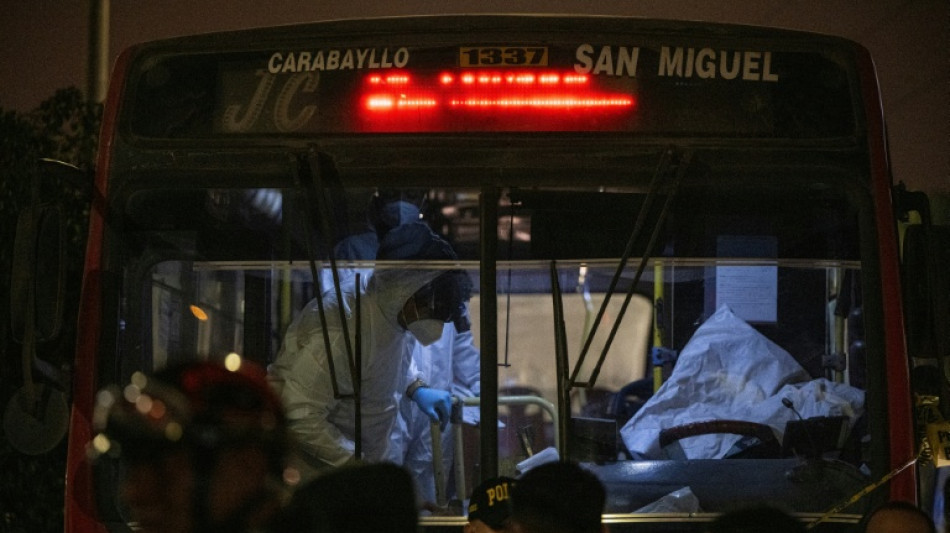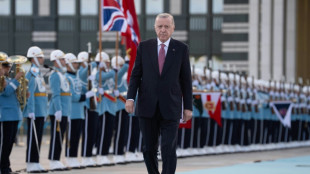
-
 Schenk wins windy Bermuda Championship for first PGA title
Schenk wins windy Bermuda Championship for first PGA title
-
Crime, immigration dominate as Chile votes for president

-
 Kane double gives England record-setting finish on road to World Cup
Kane double gives England record-setting finish on road to World Cup
-
World champions South Africa add Mbonambi, Mchunu to squad

-
 Greenpeace says French uranium being sent to Russia
Greenpeace says French uranium being sent to Russia
-
'Now You See Me' sequel steals N. American box office win

-
 Argentina beat Scotland after frenzied fightback
Argentina beat Scotland after frenzied fightback
-
Argentina beat Scotland after stunning fightback

-
 Pope urges leaders not to leave poor behind
Pope urges leaders not to leave poor behind
-
Pressure will boost Germany in 'knockout' Slovakia clash, says Nagelsmann

-
 Ecuador votes on hosting foreign bases as Noboa eyes more powers
Ecuador votes on hosting foreign bases as Noboa eyes more powers
-
Portugal qualify for 2026 World Cup by thrashing Armenia

-
 Greece to supply winter gas to war battered Ukraine
Greece to supply winter gas to war battered Ukraine
-
India and Pakistan blind women show spirit of cricket with handshakes

-
 Ukraine signs deal with Greece for winter deliveries of US gas
Ukraine signs deal with Greece for winter deliveries of US gas
-
George glad England backed-up haka response with New Zealand win

-
 McIlroy loses playoff but clinches seventh Race to Dubai title
McIlroy loses playoff but clinches seventh Race to Dubai title
-
Ecuador votes on reforms as Noboa eyes anti-crime ramp-up

-
 Chileans vote in elections dominated by crime, immigration
Chileans vote in elections dominated by crime, immigration
-
Turkey seeks to host next COP as co-presidency plans falter

-
 Bezzecchi claims Valencia MotoGP victory in season-ender
Bezzecchi claims Valencia MotoGP victory in season-ender
-
Wasim leads as Pakistan dismiss Sri Lanka for 211 in third ODI

-
 Serbia avoiding 'confiscation' of Russian shares in oil firm NIS
Serbia avoiding 'confiscation' of Russian shares in oil firm NIS
-
Coach Gambhir questions 'technique and temperament' of Indian batters

-
 Braathen wins Levi slalom for first Brazilian World Cup victory
Braathen wins Levi slalom for first Brazilian World Cup victory
-
Rory McIlroy wins seventh Race to Dubai title

-
 Samsung plans $310 bn investment to power AI expansion
Samsung plans $310 bn investment to power AI expansion
-
Harmer stars as South Africa stun India in low-scoring Test

-
 Mitchell ton steers New Zealand to seven-run win in first Windies ODI
Mitchell ton steers New Zealand to seven-run win in first Windies ODI
-
Harmer stars as South Africa bowl out India for 93 to win Test

-
 China authorities approve arrest of ex-abbot of Shaolin Temple
China authorities approve arrest of ex-abbot of Shaolin Temple
-
Clashes erupt in Mexico City anti-crime protests, injuring 120

-
 India, without Gill, 10-2 at lunch chasing 124 to beat S.Africa
India, without Gill, 10-2 at lunch chasing 124 to beat S.Africa
-
Bavuma fifty makes India chase 124 in first Test

-
 Mitchell ton lifts New Zealand to 269-7 in first Windies ODI
Mitchell ton lifts New Zealand to 269-7 in first Windies ODI
-
Ex-abbot of China's Shaolin Temple arrested for embezzlement

-
 Doncic scores 41 to propel Lakers to NBA win over Bucks
Doncic scores 41 to propel Lakers to NBA win over Bucks
-
Colombia beats New Zealand 2-1 in friendly clash

-
 France's Aymoz wins Skate America men's gold as Tomono falters
France's Aymoz wins Skate America men's gold as Tomono falters
-
Gambling ads target Indonesian Meta users despite ban

-
 Joe Root: England great chases elusive century in Australia
Joe Root: England great chases elusive century in Australia
-
England's Archer in 'happy place', Wood 'full of energy' ahead of Ashes

-
 Luxury houses eye India, but barriers remain
Luxury houses eye India, but barriers remain
-
Budget coffee start-up leaves bitter taste in Berlin

-
 Reyna, Balogun on target for USA in 2-1 win over Paraguay
Reyna, Balogun on target for USA in 2-1 win over Paraguay
-
Japa's Miura and Kihara capture Skate America pairs gold

-
 Who can qualify for 2026 World Cup in final round of European qualifiers
Who can qualify for 2026 World Cup in final round of European qualifiers
-
UK to cut protections for refugees under asylum 'overhaul'

-
 England's Tuchel plays down records before final World Cup qualifier
England's Tuchel plays down records before final World Cup qualifier
-
Depoortere double helps France hold off spirited Fiji


Peruvians live in fear as extortion runs rampant
Extortionists in Peru are becoming ever bolder: executing bus drivers at the wheel and detonating bombs at schools, holding the country in a grip of fear as police struggle to crack down.
It is a crime attractive to organized gangs but increasingly also to individual scamsters. Extortion complaints in the South American country soared by 540 percent from 2023 to over 15,000 last year, according to the justice ministry's Indaga crime observatory.
Extortion is "easy to commit and hard to combat," said police colonel Roger Cano, fighting an uphill battle against the scourge with a brigade of 50 officers working from a dilapidated building in the capital Lima.
All you need, really, is a cellphone from which to make threats.
The owner of a small clothing store in Lima told AFP how her life was turned upside down when she was unable to pay a shakedown for about $8,500.
"I started receiving text messages telling me that I had to pay... or they would take my life, the lives of my children."
Her house was attacked with explosives last Friday.
"Since the day of the attack, I haven't been going to work... My children haven't been going to school because they are afraid," said the woman, who refused to give her name for fear of retribution.
She said the police response has been insufficient.
"I have to take care of myself. We've even thought about buying guns and stuff... If they (the criminals) come back, I don't know what I would do."
- Easier than robbing a bank -
Like her, most extortion targets are not rich.
Extortioners usually call or text their victim and threaten to attack or kidnap them or a loved one unless they pay a fee -- often a recurring one.
In some cases, said a Human Rights Watch (HRW) report from July, they "use hitmen to kill those who refuse to pay."
Unlike bank robbers, for example, extortioners "don't have to take risks, they don't show their faces, they don't directly confront the police," colonel Cano said of the difficulty in finding those responsible.
At first, Peruvian extortioners zoomed in mainly on bus and moto taxi drivers.
The target group has since expanded to include small businesses, defaulters on predatory loans in a society where three out of four people work in the informal sector, and increasingly, schools.
Experts say extortion, long a problem in Peru, has really taken off amid high levels of post-pandemic poverty and unemployment, political instability following the 2022 ouster of president Pedro Castillo, and the domestic rise of gangs such as Venezuela's Tren de Aragua.
According to HRW, Congress under Castillo's successor, President Dina Boluarte, has "undermined efforts to investigate and prosecute criminal networks."
More than half of Peruvian lawmakers are themselves under investigation for corruption or other crimes, it pointed out.
- 'Distrust in the police' -
Cano's unit focuses on tracking down hitmen and seizing weapons and explosives used in extortionist crime. It is the role of police intelligence officers to hunt down gang leaders and find their earnings.
But it is an uphill battle.
According to Cano, a major problem is cellphone operators refusing to divulge the geolocations of extortioners using their networks.
His colleague Franco Moreno, who heads Peru’s kidnapping and extortion investigations division, told AFP police also lacked sophisticated tracking technology.
Add to the mix a distrusting populace fearing the police are "colluding with organized crime," said Eduardo Moncada, a political scientist at Columbia University in New York.
Last year, at least 102 homicides linked to extortion were recorded in Lima.
Some 500 schools nationwide were extorted between January and April this year, according to the collective Educar con Libertad. Several were targeted with explosives after teachers or headmasters refused to pay protection money.
Reported extortion figures "almost certainly understate the scale of the problem," said the HRW report.
"Many cases go unreported due to distrust in the police or the belief that there will be no effective response from state institutions."
K.AbuTaha--SF-PST



